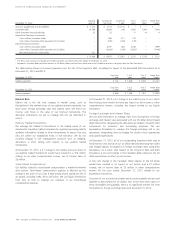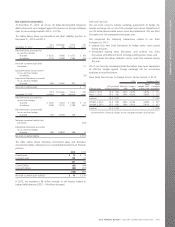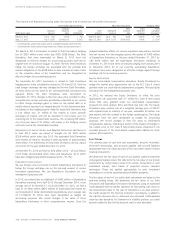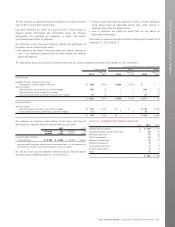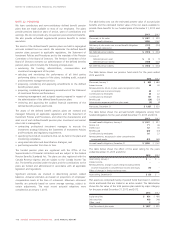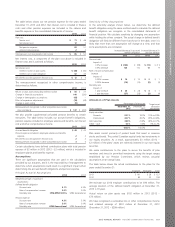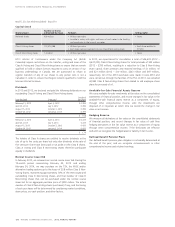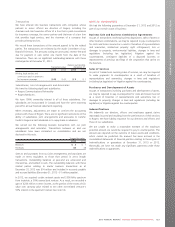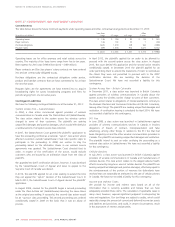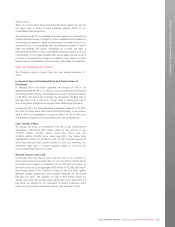Rogers 2013 Annual Report Download - page 128
Download and view the complete annual report
Please find page 128 of the 2013 Rogers annual report below. You can navigate through the pages in the report by either clicking on the pages listed below, or by using the keyword search tool below to find specific information within the annual report.
NOTES TO CONSOLIDATED FINANCIAL STATEMENTS
NOTE 27: COMMITMENTS AND CONTINGENT LIABILITIES
Commitments
The table below shows the future minimum payments under operating leases and other contractual arrangements at December 31, 2013:
(In millions of dollars)
Less than
1 year 1-3 years 4-5 years
After
5 years Total
Operating leases $ 136 $ 194 $ 95 $ 95 $ 520
Player contracts 136 132 33 7 308
Purchase obligations 1,670 1,019 149 160 2,998
Program rights 699 1,018 974 3,471 6,162
$ 2,641 $ 2,363 $ 1,251 $ 3,733 $ 9,988
Operating leases are for office premises and retail outlets across the
country. The majority of the lease terms range from five to ten years.
Rent expense for 2013 was $198 million (2012 – $189 million).
Player contracts are Blue Jays players’ salary contracts we have entered
into and are contractually obligated to pay.
Purchase obligations are the contractual obligations under service,
product and handset contracts that we have committed to for at least
the next five years.
Program rights are the agreements we have entered into to acquire
broadcasting rights for sports broadcasting programs and films for
periods ranging from one to twelve years.
Contingent Liabilities
We have the following contingent liabilities as at December 31, 2013:
System Access Fee – Saskatchewan
In 2004, a class action commenced against providers of wireless
communications in Canada under the Class Actions Act (Saskatchewan).
The class action related to the system access fee wireless carriers
charged to some of their customers. The plaintiffs are seeking
unspecified damages and punitive damages, which would effectively be
a reimbursement of all system access fees collected.
In 2007, the Saskatchewan Court granted the plaintiffs’ application to
have the proceeding certified as a national, “opt-in” class action where
affected customers outside Saskatchewan must take specific steps to
participate in the proceeding. In 2008, our motion to stay the
proceeding based on the arbitration clause in our wireless service
agreements was granted. The Saskatchewan Court directed that its
order, in respect of the certification of the action, would exclude
customers who are bound by an arbitration clause from the class of
plaintiffs.
We appealed the 2007 certification decision, however, it was dismissed
by the Saskatchewan Court of Appeal and leave to appeal to the
Supreme Court of Canada was denied.
In 2012, the plaintiffs applied for an order seeking to extend the time
they can appeal the “opt-in” decision of the Saskatchewan Court. In
March 2013, the Saskatchewan Court of Appeal denied the plaintiffs’
application.
In August 2009, counsel for the plaintiffs began a second proceeding
under the Class Actions Act (Saskatchewan) asserting the same claims
as the original proceeding. If successful, this second class action would
be an “opt-out’ class proceeding. This second proceeding was ordered
conditionally stayed in 2009 on the basis that it was an abuse of
process.
In April 2013, the plaintiffs applied for an order to be allowed to
proceed with the second system access fee class action. In August
2013, the court denied this application and the second action remains
conditionally stayed. In December 2013 the plaintiff applied for an
order permitting them to amend the Statement of Claim to reintroduce
the claims they were not permitted to proceed with in the 2007
certification decision. We are awaiting the decision of the
Saskatchewan Court. We have not recorded a liability for this
contingency.
System Access Fee – British Columbia
In December 2011, a class action was launched in British Columbia
against providers of wireless communications in Canada about the
system access fee wireless carriers charge to some of their customers.
The class action relates to allegations of misrepresentations contrary to
the Business Practices and Consumer Protection Act (British Columbia),
among other things. The plaintiffs are seeking unspecified damages and
restitution. A certification hearing is scheduled for April 2014. We have
not recorded a liability for this contingency.
911 Fee
In June 2008, a class action was launched in Saskatchewan against
providers of wireless communications services in Canada. It involves
allegations of breach of contract, misrepresentation and false
advertising, among other things, in relation to the 911 fee that had
been charged by us and the other wireless communication providers in
Canada. The plaintiffs are seeking unspecified damages and restitution.
The plaintiffs intend to seek an order certifying the proceeding as a
national class action in Saskatchewan. We have not recorded a liability
for this contingency.
Cellular Devices
In July 2013, a class action was launched in British Columbia against
providers of wireless communications in Canada and manufacturers of
wireless devices. The class action relates to the alleged adverse health
effects incurred by long-term users of cellular devices. The plaintiffs are
seeking unspecified damages and punitive damages, effectively equal to
the reimbursement of the portion of revenues the defendants have
received that can reasonably be attributed to the sale of cellular phones
in Canada. We have not recorded a liability for this contingency.
Income and Indirect Taxes
We provide for income and indirect taxes based on all of the
information that is currently available and believe that we have
adequately provided these items. The calculation of applicable taxes in
many cases, however, requires significant judgment in interpreting tax
rules and regulations. Our tax filings are subject to audits, which could
materially change the amount of current and deferred income tax assets
and liabilities and provisions, and could, in certain circumstances, result
in the assessment of interest and penalties.
124 ROGERS COMMUNICATIONS INC. 2013 ANNUAL REPORT


